MercoPress. South Atlantic News Agency
Tag: National Geographic
-
Saturday, November 2nd 2024 - 12:57 UTC
New documentary “Endurance” chronicles Sir Ernest Shackleton's legendary Antarctic voyage
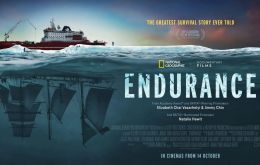
A new documentary titled Endurance has premiered, bringing to life the remarkable survival story of Sir Ernest Shackleton’s ill-fated 1914 Antarctic expedition. The film, from National Geographic Documentary Films, combines restored archival footage of the century-old expedition with the modern-day quest to discover the wreckage of Shackleton’s ship, Endurance, which was found in 2022. The documentary is directed by Academy Award® winners Chai Vasarhelyi, Jimmy Chin, along with BAFTA® nominee Natalie Hewit.
-
Friday, April 15th 2022 - 09:50 UTC
Endurance22 education programme

Since the expedition was conceived, educational outreach was a key objective. The FMHT partnered with Reach the World, the US-based education organisation, and the Royal Geographical Society (with IBG) who have successfully connected with tens of thousands of children throughout the expedition via regular live stream interviews and material produced for classroom use.
-
Wednesday, March 16th 2022 - 09:41 UTC
Ushuaia and Punta Arenas consider the 2021/2022 cruise season over
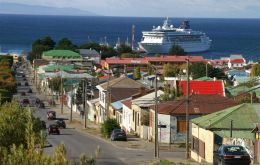
Two companies that were still organizing Antarctic cruises, over the weekend and almost coincidentally announced that the current trips would be the last, in effect putting an end to a short season.
-
Thursday, June 10th 2021 - 07:33 UTC
National Geographic makes it official, Southern Ocean is the fifth ocean
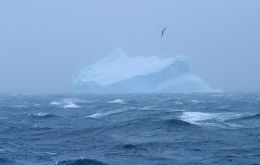
Since National Geographic began making maps in 1915, it has recognized four oceans: the Atlantic, Pacific, Indian, and Arctic Oceans. However starting on June 8, World Oceans Day, it will recognize the Southern Ocean as the world’s fifth ocean. This is because the swift current circling Antarctica keeps the waters there distinct and worthy of their own name.
-
Saturday, December 8th 2018 - 09:04 UTC
South Georgia wildlife on five National Geographic “Resurrection Island” episodes
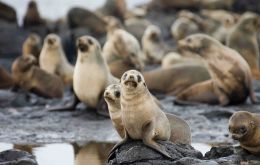
National Geographic has produced a series of 5 short films about South Georgia wildlife, according to South Georgia's Newsletter.
-
Friday, February 16th 2018 - 09:35 UTC
Falklands angry with National Geographic; demands apology to the Islands and its people

Anger has been expressed in the Falkland Islands this week over a letter which was sent to the Argentine Governor of Tierra del Fuego, Rosana Bertone, by a representative of the National Geographic Foundation. The letter, dated February 8, contains an apology for the appearance of the label ‘Falkland Islands’ instead of ‘Malvinas Islands’ on photos published on Instagram, which were taken here.
-
Friday, February 9th 2018 - 10:31 UTC
National Geographic apologizes for publishing Malvinas pictures as from the Falklands
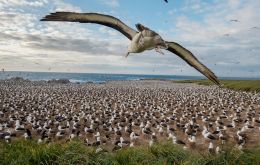
National Geographic has apologized to Tierra del Fuego governor Rosana Bertone for publishing in Instagram pictures identified as taken in the Falklands, instead of the Malvinas Islands. According to Ushuaia reports, aware of this situation, the Environment Secretary of Tierra del Fuego Mauro Pérez Toscani, on instructions from Ms Bertone addressed the National Geographic Foundation to express disappointment and demaning rectification of the Malvinas controversy.
-
Wednesday, January 31st 2018 - 16:04 UTC
Falklands ecosystem documented in National Geographic February
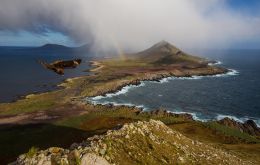
The National Geographic February 2018 will document the Falkland Islands' diverse ecosystem by wildlife photographer Paul Nicklen. The piece points out that for every permanent resident in the Falklands there are 167 sheep, but also the Islands have 65 species of birds, along marine mammals in the surrounding ecosystem.
-
Thursday, January 11th 2018 - 10:12 UTC
Weddel seal ends on the mid Atlantic Brazilian island of Trindade
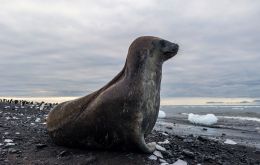
The Brazilian Navy spotted something unusual in the azure waters of the South Atlantic. In 2015, at a remote outpost and biological research station on the island of Trindade, 1,100 kilometers off central Brazil, sailors spotted a small gray seal swimming in the waves. Two days later, they found its body on the island’s Catelha beach. Scientists who went to take a closer look made an astonishing discovery—the corpse was a young Weddell seal.
-
Monday, June 15th 2015 - 06:02 UTC
“Out of the Blue”, photo competition sponsored by Prince of Wales to celebrates oceans and seas

The Prince of Wales marked World Oceans Day, last 8 June by launching a new photography competition for Commonwealth citizens to celebrate the beauty and importance of our oceans and seas: “Out of the Blue: The Prince of Wales's Commonwealth Environmental Photography Awards”.
